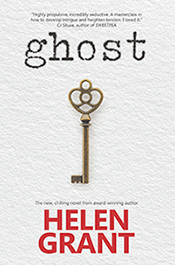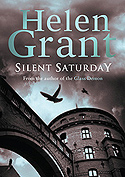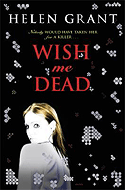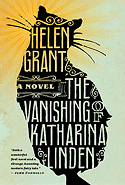The library is a wonderful working environment - warm and quiet and well-lit. The problematical side of working there is that there are so many fabulous old books that it is very difficult indeed not to get sidetracked. Librarian Lara Haggerty nearly derailed my plans for the Treatise by showing me a fascinating old book about different countries of the world - it described the German court as full of men dressed in black leather, which I must say sounded very suave! I resolved to get my hands on that book at some future point and perhaps share some of the best passages on this blog - then I wrenched my attention away from it and back to the Treatise of Specters!
As I think I mentioned in a previous post, the Treatise is a kind of anthology of creepy and supernatural stories collected by Thomas Bromhall. The copy at Innerpeffray was printed in 1658. The book is divided into different sections, and today I copied out excerpts from An History of Strange Apparitions, and cunning delusions of Devils and An History of Strange Prophecies, and Predictions of Devils.
When I transcribe passages from the book, I keep the archaic spellings (which are often quite inconsistent - the same word can be spelled in two different ways in the same paragraph), use of upper case letters and italics. The only things I can't reproduce are the archaic letters! The original version has what looks like an "f" for any "s" that occurs in the middle of a word, and very occasionally I have come across what looks like the German letter ß (a double "s"). I have put those letters into normal type to avoid confusion.
Here are the two tales from the History of Strange Prophecies, and Predictions of Devils. (I will post the others shortly.) I chose these particular excerpts because they feature characters most of us are familiar with - Merlin and Macbeth! The story about Merlin is from the works of Hector Boece (1465-1536), a Scottish academic and philosopher. The Macbeth story is from Hieronymus Cardanus (1501-1576), an Italian scientist.
From An History of
Strange Prophecies, and Predictions of Devils.
122. Hector Boethus in the Scottish affairs saith, it was a common
report, that Merline was begotten by
the copulation of a spirit called Incubus,
and a Brittish woman of a Noble
bloud, of whom Vincent. In 21. book
History 30. thus telleth. King Vortiger,
counsell being taken what he ought to do for defence of himself, commanded
cunning workmen to be called unto him, who should build a most strong Tower.
But when as the Earth swallowed up their works, they perswaded the King, that
he should search out a man without a father, with whose bloud the stones and
morter might be sprinkled, as if by that means the morter would be made firm. Therefore
the young man Merline by name, was
found, who with his Mother is brought before the King, who confesseth he was
conceived by a spirit in Mans shape. This Merline
revealed many dark things, and foretold things to come. For he opened that
under the foundation there was a lake, under the Lake two Dragons lay hid,
whereof one being red, did signify the people of the Brittains, but the other being white, of the Saxons; and he also prophesied, that Aurelius Ambrose, Hengist being overcome, and Vortiger burnt, should reign. Vier.b.2.ch.46.
of the Delusions of Devills.
176. Machabaeus King of the Scots, fearing Macduffus, being admonished by Soothsayers, was told by a woman a
Fortune-teller, that he should not fall by the hands of any man that was born of
a woman, and that he could not be overcome before the wood Bernen were carried to the Castle Donusinna, which was a great way distant. Therefore he falsly
thought himself invincible, and free from strategems and deceits of his
enemies, having cut down the wood Bernen,
and carried every stick to the Castle; wherewith he compassed the Castle the
day before he was overcome: to be short, he was slain by Macduffus, who was not born, but cut out of his Mothers belly. Cardanus de rerum varietate.Lib.16.cap.93.
...I particularly like the latinised names in the story from Cardanus. "Macduffus" is splendid!










No comments:
Post a Comment